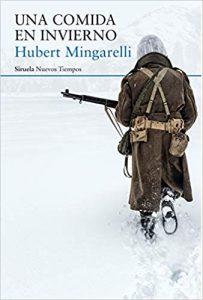A synthetic book in all its aspects, from its few pages to its short sentences. But nothing is casual in Hubert mingarelli, everything has its explanation ...
The conciseness can become unsettling when you masterfully delve into a dark narrative like this. It is not necessary to go into more detail about the worst of the human being. We have a cold and soulless scene, some armed men, a smell of death that seeps into the cold currents of the Polish winter during World War II. Executioners and victim walking together towards the summary justice of death by starvation. And not even because of that extreme coexistence can an iota of humanity flourish.
Hatred feeds them all, the three soldiers and the hunter they make pineapple with. On the other side of the focus, the Jew who must be transferred to his destination written by the final solution dictated by the Third Reich.
The story is told by one of those three soldiers trained in hatred. Accompany him Emmerich and Bauer. All three have gotten a break from their arduous task of pulling the trigger in an automated fashion. The sinister trio that makes up an operative group of itinerant executions (Like the street vendors who arrived warned by their shots instead of by a megaphone), goes in search and capture of new live prey to the pride of their macabre leader.
And they soon find their target. Except that the road becomes hard and they need a rest in an old cabin with a hunter who feels the same animosity towards the Jews as they do themselves.
But time passes and the harsh winter keeps them locked in the cabin, with the pangs of hunger creeping in like a pressing hallucination. And the time shared between all seems to awaken some hint of conscience linked from the particular situation of each character.
But hunger is hunger. Survival begins with the most physical sustenance. And the food must be improvised.
The arrival of the hunter with his offer of an alcohol with which to tame the stomach and conscience a little, raises the tension. Soldiers act against Jews by command and command. They may not even feel any empathy. But the hunter ... his simple gaze towards the detainee reveals the monstrosity of hatred.
Among the characters located in an extreme setting, the reader is the one who is in charge of analyzing and trying to find the reasons for each action in this preparation for an improvised meal. No invitation in the middle of a lonely place reached us with the brutal outbreak of consciousness, making us doubt whether the human being can really harbor what he can manifest in any war. Understanding also that, in that place there is no war, no trenches ..., it is only about people who haunt the hell of dehumanization encouraged by power, with the only hope of the flashes of conscience.
You can now buy the novel A Winter Meal, an interesting book by Hubert Mingarelli, here:

